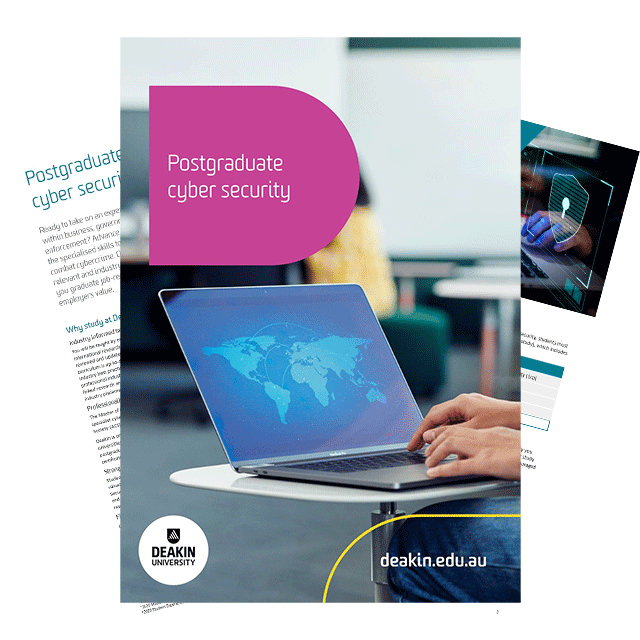Key facts
Duration
One year part-time
Locations
Key dates
Direct applications to Deakin for Trimester 2 2024 close 23 June 2024
Direct applications to Deakin for Trimester 3 2024 close 27 October 2024
Current Deakin Students
To access your official course details for the year you started your degree, please visit the handbook
Course overview
In today's digital world – where technology is central to business, government and daily life – cyber security threats are a major challenge across many industry sectors. And as cyber-attacks are becoming everyday occurrences, cyber security professionals are in increasing demand globally.
Through the Graduate Certificate of Cyber Security, you will learn how to identify, diagnose and manage the challenges of cyber security threats, and graduate ready for a successful cyber security career anywhere in the world.
Focusing on a range of key industry-relevant areas, you will develop knowledge and expertise about system security and digital forensics, analytics and organisational security.
This course gives you the cyber security skills that are crucial to the success of our digital future. You will graduate equipped with the knowledge and talent to take on an expert security role within business, government or law enforcement.
Course information
- Award granted
- Graduate Certificate of Cyber Security
- Year
2024 course information
- Deakin code
- S535
- Level
- Postgraduate (Graduate Certificate and Graduate Diploma)
- Australian Qualifications Framework (AQF) recognition
The award conferred upon completion is recognised in the Australian Qualifications Framework at Level 8.
Course structure
To complete the Graduate Certificate of Cyber Security, students must attain 4 credit points (one year part- time study), which must include the following:
- DAI001 Academic Integrity Module (0-credit point compulsory unit)
- four (4) core units (4 credit points).
Students are required to meet the University's academic progress and conduct requirements.
Intakes by location
The availability of a course varies across locations and intakes. This means that a course offered in Trimester 1 may not be offered in the same location for Trimester 2 or 3. Check each intake for up-to-date information on when and where you can commence your studies.
Trimester 1 - March
- Start date: March
- Available at:
- Waurn Ponds (Geelong)
- Online
Trimester 2 - July
- Start date: July
- Available at:
- Online
- Waurn Ponds (Geelong)
Trimester 3 - November
- Start date: November
- Available at:
- Online
*This course can only be completed part-time for T3.
INTERNATIONAL STUDENTS – Please note that due to Australian Government regulations, student visas to enter Australia cannot be issued to students who enrol in Deakin online studies.
Additional course information
Course duration
Course duration may be affected by delays in completing course requirements, such as accessing or completing work placements.
Mandatory student checks
Any unit which contains work integrated learning, a community placement or interaction with the community may require a police check, Working with Children Check or other check.
Workload
You can expect to participate in a range of teaching activities each week. This could include lectures, seminars, practicals and online interaction. You can refer to the individual unit details in the course structure for more information. You will also need to study and complete assessment tasks in your own time.
Participation requirements
Reasonable adjustments to participation and other course requirements will be made for students with a disability. More information available at Disability support services.

Take the next step to a brighter future
Kickstart your career growth. We'll prepare you for the career you've always wanted.
Download course guideEntry requirements
Selection is based on a holistic consideration of your academic merit, work experience, likelihood of success, availability of places, participation requirements, regulatory requirements, and individual circumstances. You will need to meet the minimum academic and English language proficiency requirements to be considered for selection, but this does not guarantee admission.
Academic requirements
To be considered for admission to this degree you will need to meet at least one of the following criteria:
- completion of a bachelor degree or higher in a related discipline
- completion of a bachelor degree or higher in any discipline and at least two years' relevant work experience (or part-time equivalent)
- completion of a Graduate Certificate of Information Technology or equivalent
English language proficiency requirements
To meet the English language proficiency requirements of this course, you will need to demonstrate at least one of the following:
- bachelor degree from a recognised English-speaking country
- IELTS overall score of 6.5 (with no band score less than 6.0) or equivalent
- other evidence of English language proficiency (learn more about other ways to satisfy the requirements)
Admissions information
Learn more about Deakin courses and how we compare to other universities when it comes to the quality of our teaching and learning.
Not sure if you can get into Deakin postgraduate study? Postgraduate study doesn’t have to be a balancing act; we provide flexible course entry and exit options based on your desired career outcomes and the time you are able to commit to your study.
Recognition of prior learning
Deakin aims to provide students with as much credit as possible for approved prior study or informal learning which exceeds the normal entrance requirements for the course and is within the constraints of the course regulations.
Students are required to complete a minimum of one-third of the course with Deakin, or four credit points, whichever is the greater. In the case of certificates, including graduate certificates, a minimum of two credit points within the course must be completed with Deakin.
You can also refer to the Recognition of prior learning Page which outlines the credit that may be granted towards a Deakin degree and how to apply for credit.
Recognition of prior learning may be granted to applicants based on prior studies and/or equivalent industry experience.
Fees and scholarships
Fee information
Learn more about fees and your options for paying.
The available fee places for this course are detailed above.
Tuition fees are determined by your enrolment:
- If you are offered a full fee paying place, your tuition fees are calculated based on your course.
- If you are offered a Commonwealth supported place, your tuition fees are calculated depending on the units you choose. A limited number of Commonwealth supported places are available for this course.
The 'Estimated tuition fee' is provided as a guide only based on a typical enrolment of students completing this course within the same year as they started. The cost will vary depending on the units you choose, your study load, the length of your course and any approved Recognition of prior learning.
One year full-time study load is typically represented by four credit points of study for Graduate Certificates. Each unit you enrol in has a credit point value. The 'Estimated tuition fee' is calculated by adding together four credit points of a typical combination of units for your course.
You can find the credit point value of each unit under the Unit Description by searching for the unit in the Handbook.
Learn more about fees and available payment options.
FEE-HELP calculator
What is FEE-HELP?
FEE-HELP loans cover up to 100% of tuition fees for eligible students. By taking out a FEE-HELP loan, the government pays your tuition fees directly to Deakin, and the balance is repaid from your employment income - but only once you're earning over $51,550.
Please note: fees shown by the calculator are indicative only and based on 2024 rates. Actual fees may vary. We advise confirming fees with Prospective Student Enquiries prior to enrolment.
Estimate your FEE-HELP
FEE-HELP payments
per pay cycle
Take-home pay
after FEE-HELP and tax
per pay cycle
Your estimated FEE-HELP repayments
- $* is the estimated full cost for a Graduate Certificate of Cyber Security (4 credit points), based on the 2024 fees.
- is the annual FEE-HELP payment, based on your current salary
- of your current salary be spent on FEE-HELP
*Disclaimer
Deakin University (Deakin):
- gives no warranty and accepts no responsibility for the currency, accuracy or the completeness of the information provided;
- advises users that no reliance should be placed upon on the information provided, and;
- instructs users that they should confirm the actual course fee with Prospective Student Enquiries prior to enrolment.
This tool provides indicative information about the fees that will be payable in respect of courses and subjects offered to prospective students domiciled in Australia during the periods indicated.
Please note that the fees shown by the calculator are indicative only and actual fees may vary. Users are advised to confirm the actual course fee with Prospective Student Enquiries prior to enrolment.
The estimated course fee is based on the tuition fee costs applicable to a domestic full time student commencing the course in Trimester 1 and studying full time for the duration of the course but:
- does not include non-tuition costs that may apply, such as Student Services and Amenities Fees (SSAF);
- does not take into account any scholarships or bursaries awarded to the student (including the 10% Deakin alumni discount);
- assumes the maximum number of units that need to be successfully completed actual number completed may be reduced if recognition of prior learning is granted;
- assumes that no exceptional, or non-typical, circumstances apply to the proposed course of study;
- assumes that the options that the user selects are appropriate for the course of study that they intend to undertake;
- where fees are estimated for future years those fee will be subject to annual increases in accordance with increases in the cost of course delivery.
Scholarship options
A Deakin scholarship might change your life. If you've got something special to offer Deakin – or you just need the financial help to get you here – we may have a scholarship opportunity for you.
Postgraduate bursary
If you’re a Deakin alumnus commencing a postgraduate award course, you may be eligible to receive a 10% reduction per unit on your enrolment fees.
Apply now
Some of our courses have limited places available - for the latest on courses still open for application, visit Courses by trimester.
Create an account in the Deakin Application Portal, start your application, enter personal details, education experience, upload supporting documents and submit. Need help? Play this video, or contact one of our friendly future student advisers on 1800 693 888 or submit an online enquiry.
For more information on the application process and closing dates, see the How to apply webpage. If you're still having problems, please contact us for assistance.
Entry pathways
After successfully completing your graduate certificate, you can continue your study by using the credit points you’ve earned to enter the:
Contact information
Our friendly advisers are available to speak to you one-on-one about your study options, support services and how we can help you further your career.
- Call us: 1800 693 888 Mon–Fri, 9am–5pm
- Live Chat: Mon–Thurs, 8am–7pm, Fri 8am–5pm
- Submit an online enquiry
- Help hub find common and trending questions and answers
Careers
Career outcomes
Graduate with the skills needed to thrive in a booming industry and help secure our digital future from a university ranked in the top 1% globally for computer science and information systems*
Career options are varied so you could work anywhere in the world as a:
- security analyst
- project manager
- security system manager
- security consultant
- security system developer or programmer information security auditor
- business continuity or IT security engineer.
*2022 ShanghaiRankings Global Ranking of Academic Subjects
Course learning outcomes
Deakin's graduate learning outcomes describe the knowledge and capabilities graduates can demonstrate at the completion of their course. These outcomes mean that regardless of the Deakin course you undertake, you can rest assured your degree will teach you the skills and professional attributes that employers value. They'll set you up to learn and work effectively in the future.
| Deakin Graduate Learning Outcomes | Course Learning Outcomes |
| Discipline-specific knowledge and capabilities | Develop specialised and essential knowledge of security needs for design and development of secure systems, processes, concepts, and technologies; to develop software systems, products and solutions that automate business processes at par with benchmarks and industry standards and based on evolving cyber security needs. |
| Communication | Communicate secure solutions as appropriate to the context to inform, motivate and effect change utilising a range of verbal, graphical and written methods, recognising the needs of diverse technical and non-technical audiences. |
| Digital literacy | Use digital media to locate, collect and evaluate information from technical sources and apply cyber security discipline knowledge to identify approaches and solutions that meet the requirements of real-world organisations in the context of the evolving cyber threat landscape. |
| Critical thinking | Use the frameworks of logical and analytical thinking to evaluate specialist computing assets, technical problems, and user requirements, and develop approaches to develop innovative solutions for real-world practice of cybersecurity. |
| Problem solving | Develop secure, research-informed solutions through investigation of technical and business problem domains; and execute projects to improve services and user experiences. |
| Self-management | Demonstrate ability to understand and apply ethical standards and work professionally and autonomously to identify processes for continuous improvement; manage projects whilst incorporating professional development needs. |
Approved by Faculty Board 23 September 2021




